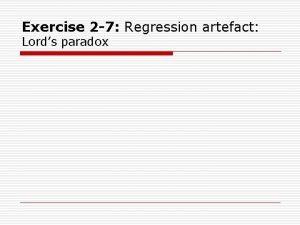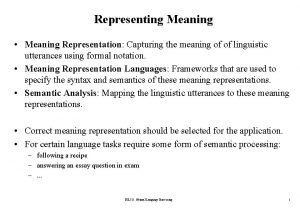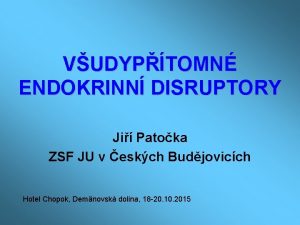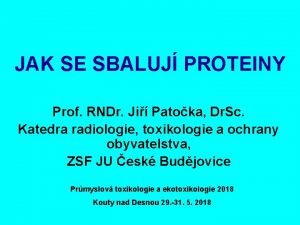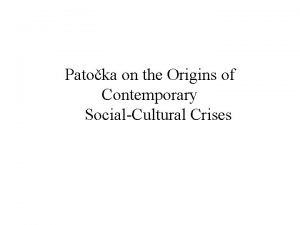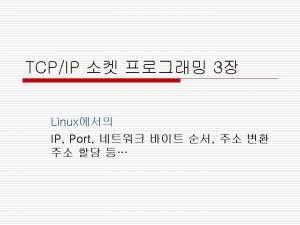Patoka The Meaning of History Short recapitulation from















- Slides: 15

Patočka: The Meaning of History

Short recapitulation from last time: What precisely is heretical about Patočka´s perspective? • Against Marxism: historical development is not determined by objective economical processes. • Against Enlightenment rationalism: history is not a progressive discovering of truth against prejudices. • Against eschatological conceptions: history does not have its pre-given telos. • The history consists of essentially conflictual, polemical relation of the present with the past, for the sake of opening new future possibilities. • Patočka´s position is essentially heretical because it questions any position of unified, overarching meaning of history.

Main thesis • The history is nothing other than the constant, ever repeated shaking of naive meaning, of all certitudes about pre-given meaning. History does not have any other meaning or goal. • „History arises from the shaking of the naive and absolute meaning in the virtually simultaneous and mutually interdependent' rise of politics and philosophy. ” (HE, page 77)

“The meaning of meaning” 1. 1. Meaning vs. Purpose • the concept of meaning should not be conflated with the concept of purposefulness • „The meaning is not reducible to purpose” (p. 55) • There are purposeful actions that have lost their sense (e. g. contemporary sciences which lost their original meaning and find no other justification than instrumental). • There are non-intentional speech acts, behaviors that are nevertheless meaningful.

1. 2. Meaning vs. Value • Values such as beauty or goodness are not purposes in themselves, but their implementation can become a purpose of human action. • Value can be understood as the meaning of a concrete being, expressed by means of some quality. • The concept of value makes something appear as an independent, positive being.

1. 3 Where does the meaning of things come from? • There is no such thing as meaning in itself. There must be someone who sees things as meaningful. • Sense is not directly in the things (in abstraction of human involvment with them). • Meaning of the world results from our openness to it.

1. 4 Do we create meanings? • We do not create meaning. It is not a question of our will, because we do not have the influence that things in a given circumstance would appear to be meaningful or meaningless.

2. The meaning of life in the historical and prehistoric period Prehistorical period “Prehistoric humanity is quite modest in its valuation of human life, for them the world seems to it in some sens orderly, justified” Historical period Man tries to create a specifically human region of being, independent of external sense (in polis, in community life) Shaking of naive, merealy accepted meaning goes hand in hand “Experiences of mortality, of natural and social catastrophes, do with the seeking for meaning by our own means (dialogue, not shake it. For life to be meaningful, it is enough to know that interrogation, insights, contests) the gods have reserved the best for themselves: eternity in the „humans make room an autonomous, purely human sense of immorality. ” (61) meaningfullness” (63) Searching for a different meaning than the meaning provided by In politics as well as in philosophy, humans are open to what is the gods is not a human matter. disclosed as problematic meaning in polemical situations. The meaning is mostly connected to maintaining and procuring life's needs („bondage of life to itself” (62)) The quest for „freer more demanding menaingfulness” (63) The meaning of human existence depends on some external instance (Gods). The meaning is no more bounded by life´s repetition and survival. People take responsibility for themselves and others seeking for a new meaning for which they are accountable.

3. The relation between meaning and philosophy. • Philosophy has shaken the prehistoric life rhythm (everything is guided by the preestablished values) in order to enrich it and free it from the external, divine meaning. • Plato's metaphysics is characterized by a specific duality. Plato distinguishes the concept of chorismos, which means the gap, the gap between “the real world” and the world around us. • However, the sphere of politics belongs to the context of the "real world". • Philosophy „cannot provide human life with a higher meaning which would be clearly positive, clearly intelligible and free of the mystery” (66) • Instead of promissed certainty, it leads to doubt (Idem)

4. The Christian concept of the meaning of history. • The Christian faith and its meaning is not a sense sought by man, but something provided from outside. • Faith shows: a) man's misery and b) incapacity to generete meaning to bestow on the world • The Christian, in the face of human misery (vanitatis), does not renounce the meaning of his faith, but insists on it more strongly. • In a community created on the basis of faith, „all humans are equal in the face of the ultimate „true” reality. ” • only after death, they become participants in the sense in which they believe. • European humanity is so accustomed to the Christian conception of history that even when the concept of God lost its original meaning, a humanity appeared in his place (as the one who bestows the meaning on everything, incl. history). (69)

5. The relation between meaning and modern sciences. • The natural science, according to Husserl´s Crisis, became a discipline concerning incomprehensible facts. It becomes the nihilism of nature. • Nihilism is present in the project of formalized account of reality as a sum of mere facts. • Husserl: „Merely fact-minded sciences make merely fact-minded people” (Crisis, 1970, p. 6) • The science that understand itself as a science dealing with objects and causalities draws its meaning only from practical utility dictated by society (HE, 71) • Science loses its inner sense, so it cannot coherently claim that its results were misused (atomic bombs, ecological consequences of our technoscience) (p. 72)

6. The Meaning and the problem of nihilism • Situation of today: fighting of two nihilisms • Patocka distinguishes two nihilisms in the Nietzschean sense: active and passive nihilism. • A) Passive nihilism of those who are still captivated by the image of meaning beyond this world (or rather “the remnants of antiquated meanings“ (73)) • B) Active nihilism: unscrupulous exploitation of what there is – from the standpoint of strenght (force) and power (Nietzsche´s followers)

7. Conclusions. • The experience of losing meaning teaches is the path for the pursuit of higher, however always problematic meaningfulness for which are ourselves responsible. • Meaning is not some kind of presence that can be merely stated. It is only something for which we can be open in our seeking of meaningfullness. • Due to the shaking of naive, accepted sense, the perspective of absolute sense is created, but not as something external to our disclosive capacities and open comportements.

Questions to be addressed • Patočka´s main proposal : the need for general conversion “metanoia” • The future of humanity depends on its capacity to effectuate a historical and “gigantic” metanoiesis, conversion, where it will stop from augment its technological domination over life. • It will both accept the responsibility for meaninglessness produced by technoscience, and the responsibility for the meaning “both absolute and problematic”. • “Those who are capable of understanding what was and is the point of history” -> Philosophers?

Problems to be adressed: • Is it necessary to go through the absolute shaking of all meaningfulness? • If conflicts are inevitable, why is this so?
 Tall+short h
Tall+short h Recap introduction
Recap introduction Base rate
Base rate Recapitulation definition
Recapitulation definition Hát kết hợp bộ gõ cơ thể
Hát kết hợp bộ gõ cơ thể Bổ thể
Bổ thể Tỉ lệ cơ thể trẻ em
Tỉ lệ cơ thể trẻ em Voi kéo gỗ như thế nào
Voi kéo gỗ như thế nào Tư thế worm breton
Tư thế worm breton Chúa yêu trần thế alleluia
Chúa yêu trần thế alleluia Các môn thể thao bắt đầu bằng tiếng bóng
Các môn thể thao bắt đầu bằng tiếng bóng Thế nào là hệ số cao nhất
Thế nào là hệ số cao nhất Các châu lục và đại dương trên thế giới
Các châu lục và đại dương trên thế giới Công thức tiính động năng
Công thức tiính động năng Trời xanh đây là của chúng ta thể thơ
Trời xanh đây là của chúng ta thể thơ


